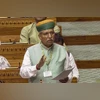Why can't India be an arbitration hub: Law minister Arjun Ram Meghwal
Meghwal said the BJP government has passed the Mediation Bill recently
)
Union Law Minister Arjun Ram Meghwal
Why can't India become a hub for arbitration? asked Minister of Law and Justice Arjun Ram Meghwal.
He was speaking at the ASSOCHAM Bharat Legal Conclave & National Legal Excellence Awards 2023.
Meghwal said the BJP government has passed the Mediation Bill recently.
"Why can't India become a hub for arbitration? We see that in Singapore, Hong Kong arbitration cases, the parties in the dispute are Indians and the lawyers arguing these cases are also Indians! When they can do their arbitration cases there, then why can't they do their arbitration cases here in India? We have to think in this direction," he said.
He said India can also become the hub for arbitration. "We have passed the Mediation Bill; there was a mention of commercial courts; these are improvements because they require technical expertise, but I am saying your (legal fraternity) work is more important," he said.
Also Read
He also said the Modi government has brought significant changes in three key legislation. "We are doing a lot of work. We are improving IPC, CrPC. Nobody has strived to make these legislation better before. There is also The Indian Evidence Act 1872. There are a lot of names in it which do not match with our independence. Nobody thought about it! Prime Minister Modi thought of it in totality. We have proposed a bill with amendments to IPC, CrPC, and Evidence Act; our Home Minister introduced it, and we are working on it soon," he said.
Talking about the pendency of cases, he said his first statement after becoming the law minister was to reduce pendency. "It's not like we have not thought of solutions. From Lok Adalat to mobile courts, we have used technology to address this, but the pendency kept increasing. The reasons for this may be manifold; if we sit together, we can discuss it," he said.
He also said that body, mind, intellect and soul should be at the same pace, so there will be fewer fights. "If it's at the same pace, then we will have less anger towards others; our mind will be at peace, and this is the tradition of Bharat; you have put the name of the event too as Bharat Legal Conclave. We are in the Azadi ka Amrit Mahotsav, 75 years. How to go beyond this, there is time for a discussion on this, but how will the 25 years ahead be like? We should discuss that too," he said.
At the same conclave, Preeti Malhotra, Chairman, Smart Bharat Group and Chairperson, ASSOCHAM National Council for Corporate Affairs, Company Law and Corporate Governance, said, "ASSOCHAM has been contributing from the forefront for policy changes that align with the mandate of almost all the ministries and regulators under Government of India and works in sync with international best practices. Legal and regulatory affairs are an important subject for businesses and industry. ASSOCHAM has been playing a critical role in this area."
The conference was attended by Hon'ble Justice Shri Dipak Misra, former Chief Justice of India. Among those who joined him were notable personalities such as Suresh Chandra, Information Commissioner at the Central Information Commission of India and former Secretary at the Ministry of Law and Justice of India, who participated as a Special Guest.
Meanwhile, Suresh Chandra, Information Commissioner, Central Information Commission, Government of India; & Former Secretary, Ministry of Law and Justice, Government of India, speaking at the conclave, offered his legal expertise. He enlightened the audience by saying that the whole legal system operates under a scheme and has four components: basic principles and values enshrined in the constitution, rights and obligations contained in the various statutes, organisation structure of laws and legal personnel.
The Preamble of the Constitution emphasised the unity of the nation and it proceeds further to define the objective of the Indian republic, he added. Increased transparency in law and the emphasis on an all-inclusive approach is the new aspiration for the legal structure in India.
Talking about competition law, he added, "In a developing economy like ours, the new competition policy is expected to play a dual role of raising the power of underprivileged economic agents to become participants in the process of competition on the one hand and of establishing the rules of fair and free competition on the other. Fair and free competition is vital for the requirement for sustained economic growth."
Offering his keynote address, Rajiv Mani, Additional Secretary, Ministry of Law & Justice, Government of India shared that the Indian legal system should be reinvented to meet the challenges of present times and achieve improved reforms and judicial efficiency by 2047 under Azadi ka Amrit Mahotsav. There is a need to examine the existing obsolete laws that hinder the legal framework.
"We should strive to improve the access to justice by the use of technology and alternative dispute management systems for ease of doing business. Several parameters can help reduce the compliance burdens for businesses. The Jan Vishwas Bill has decriminalised many laws, taking all stakeholders into account," he added.
He further talked about the new reservation system for women in parliament and legislative assembly as a groundbreaking step and that it is time to empower young minds with legal education.
More From This Section
Topics : Arjun Ram Meghwal Law Ministry Assocham
Don't miss the most important news and views of the day. Get them on our Telegram channel
First Published: Oct 20 2023 | 8:27 PM IST
